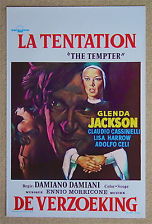
THE TEMPTER
UK/Italy, 1974, 106 minutes, Colour.
Glenda Jackson, Claudio Casinel1i, Lisa Harrow, Adolfo Celi, Arnoldo Foa.
Directed by Damiano Damiani.
The Tempter is a strange Italian film for the very English Glenda Jackson to star in. Its issues are particularly those of the Italian Catholic Church. Miss Jackson is Sister Geraldine, Superior of a convent-hostel in Rome. Many of the
guests are fleeing guilt, or unable to face life, or in need of some psychological therapy - which the Superior provides, especially in group work. Sister Geraldine does not admit to the personal fulfilment she gains in prying into people and trying to improve them. There are emotional clashes in the several sub-plots as well as some caustic comment on aspects of Church administration.
1. The purpose of this film. the audience for which it was made? Impact on Catholics, Italians, non-Catholics, non-Italians? Was the film too particularly bound to the Church and to Italy?
2. The significance of the title? To whom did it refer? The Devil and temptations? Sister Geraldine? Rodolfo?
3. Response to the structure of the film: the presentation of the hotel itself, the guests and their various rooms, the reasons for their being there.. their particular crises? Sister Geraldine presiding over all these guests and the hotel?
4. How credible was the plot.. how credible were the characters and their crises? The particular linkage to the Church and its problems in the twentieth century? Questions of authority, abuse of power? The psychological overtones? The group therapy work of the 60s and 70s? The healing aspects of Confession and the Sacraments?
5. The presentation of the hotel itself: corridors rooms, colour? The nuns and their grey habits? The cold coloured emphasis?
6. Comment on the spirituality of the Order, as seen in Sister Geraldine, her prayers and spiritual exercises, devotion to Saint Theresa? The significance of the order looking after such guests? The way the Vatican saw the Order?
7. Glenda Jackson's performance as Sister Geraldine? The strengths she brought to the character? Her role of ruling and her enjoyment of this? The strengths of her personality? Her reliance on Father Borelli? Her interest in the various guests, her conducting of the group therapy sessions her work on counselling, her effect on people, the effect of the counselling on her, her need for it and liking for it? Was she creating situations for her own gratification? Her handling of the crises? Her handling of the investigation by the Vatican? How did she change throughout the film?
8. How did the public figure of Sister Geraldine contrast with her in private? Her charity. asceticism?
9. The reaction of people to the investigation? Her being placed under obedience not to conduct group therapy? The emphasis that she should continue with the finances? The motivation for her decision to continue?
10. The impact of Rodolfo arriving in the hotel? How credible a person was he, strengths of character our seeing the convent through his eyes when he arrived; his encounter with Emily.. temptation to interfere, his work with the Monsignor? The alienation from the way of life in the hotel? His challenging to its values? The religious confrontation? His interfering in people's lives leading to Otavio's suicide? His decision to leave? His tempting Emily to go? The significance of his return, Sister Geraldine's tempting him to stay?
11. what was the significance of the confrontation between Geraldine and Rodolfo? The respective values they stood fro their clash interaction? How close at the end was Rodolfo in succumbing to Sister Geraldine's invitation?
12. How important was the character of Emily? As a person, her role in the hotel, the background of South America and her sense of guilt, her fascination with Rodolfo, sensuality and the effect on her, the change in her life, her decision to leave, her inability to remain away from the convent and the significance of her return?
13. The Monsignor and his guilt about the war? How important was this theme, how well was it explored, the sense of guilt and expiation? The preparations for the book, the pleas for the Vatican officials to hear him and their putting him off? How pathetic a character? Would he find peace and salvation?
14. The reasons for Otavio being present at the hotel? The effect of the therapy on him? Rodolfo, the suicide? His relationship with his sister, the irony of her arriving at the end?
15. How well explored were the characters of the worker priest, the revolutionary Bishop? What issues were being raised here, what aspects of Church policy being criticised? Justly?
16. Audience response to the therapy sessions; themes of guilt, control, power, the group all deciding to leave, the irony of their all returning?
17. was the film religious? How interesting on the religious level. psychological? The interaction between the person and the institution?
18. Themes of the Church, human nature and sin, guilt and healing?